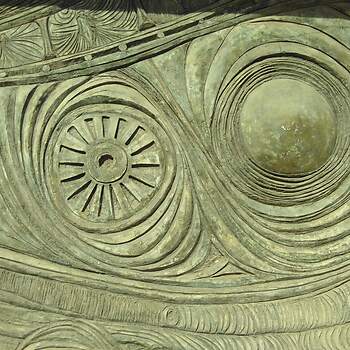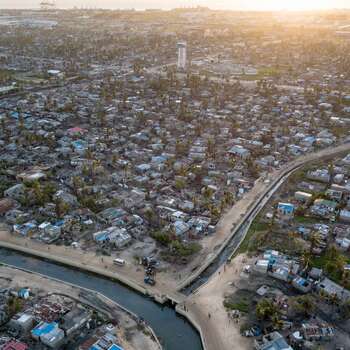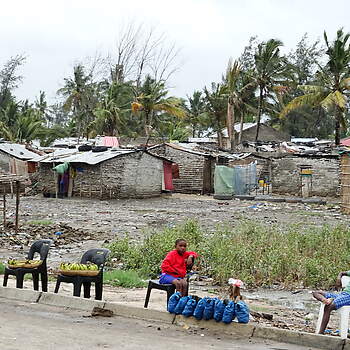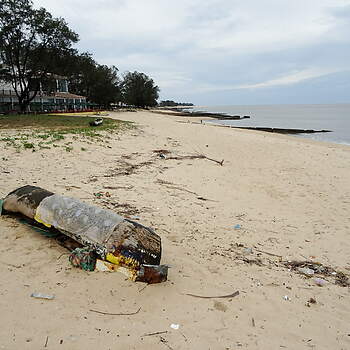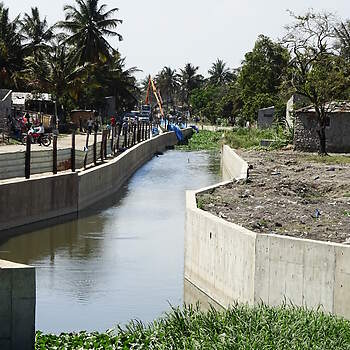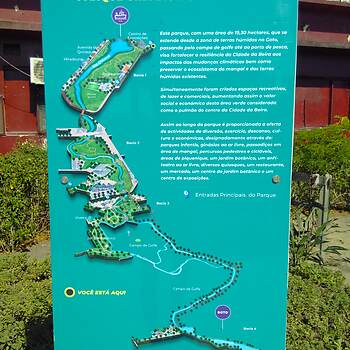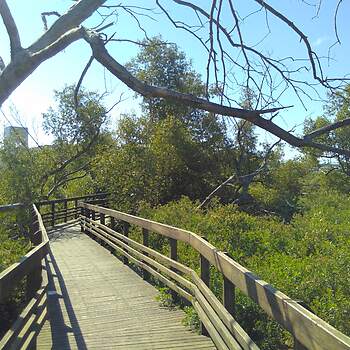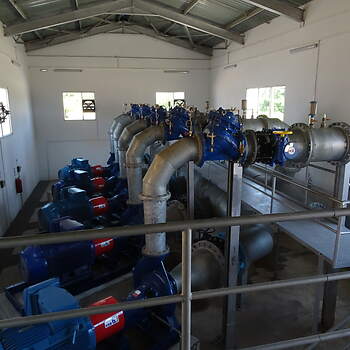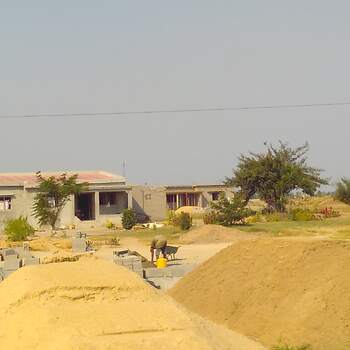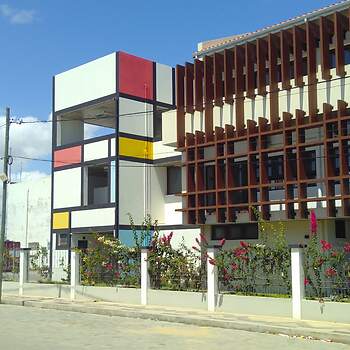Beira
The coastal city of Beira in the central part of Mozambique is functioning as a main port for the Mozambican hinterland and land-locked Zimbabwe. It has a terminal for coal from Tete, but Nacala in Nampula province has taken a more prominent role since it got a railroad connection. Beira is one of the main cities in Mozambique with about 600,000 inhabitants. From 1978 it received Dutch support, starting with sanitation and drainage. The town centre and surrounding areas are built in a former marshland, which is prone to inundations with high rainfall and sea surges. In the 90s, Beira had a twinning with Amsterdam. Dutch companies were involved for studies on coastal protection and projects to keep the harbour accessible. Because of the economic relevance of the city, the bilateral relation got a new boost after 2010.
Water Mondiaal
In 2011 a restart was made in the cooperation with Beira through the Water Mondiaal program. This programme was combining ODA funding from the Dutch Ministry of Foreign Affairs with non-ODA funding from the Dutch Ministry of Infrastructure and Water Management. It aimed to combine the traditional policy areas of development cooperation and included knowledge exchange on topics of Dutch excellence such as coastal protection, urban water management, and climate change adaptation. In contrast to many pre-defined programmes, the cooperation with Beira was designed to be demand driven, to start small and to be allowed to develop organically. To flexibly manage and give direction to the ‘program’ with Beira, a Dutch team was created, consisting of representatives from the Ministry of Foreign Affairs, EKN Maputo and RVO. In 2013 the Dutch team hired a process management consultant for the liaison with the partners in Beira. This coordination structure was in place until the end of 2021. It oversaw the inclusion and application of various funding streams to support the growing ‘program’ of the cooperation with Beira aimed at the implementation of the Beira Master Plan.
In the IOB evaluation of bi-lateral climate adaptation projects between 2016 – 2022, with case studies from Mozambique and Bangladesh, the Beira Master Plan project cluster gets an intermediate scoring (IOB 2023).
Decisive leadership
The anchor of the cooperation was the pro-active involvement of the dynamic Mayor of Beira (Daviz Simango, Mayor from 2004-2021). The starting point was the request of the municipality of Beira in 2011 for Dutch support in preparing an urban master plan for the city. Dutch consultants supported the drafting of the Beira Master Plan 2035. The Master Plan was developed in 2013 and approved by the Municipal Assembly in 2014. It was considered to be a guideline for the development of the city and a platform for cooperation with its funding partners.
Donor alignment
With the support of the Dutch partners, the Beira Municipality started in 2015 with annual ‘Round Table Dialogues’ with its finance partners (GCA 2021). Apart from the Netherlands these included the World Bank, European Union, KfW, AFD, JICA and others.
The desired donor alignment around the Beira Master Plan was not leading to significant investments from other finance partners, until the cyclone Idai struck Beira in March 2019. In the aftermath of the cyclone, the Netherlands supported a Beira-led Disaster Risk Reduction effort, in cooperation with UNDP and UN-Habitat. This led to an update of the Master Plan: the Beira Municipal Recovery and Resilience Plan, forming an integral part of the nationwide Post Disaster Needs assessment. The plan was found to be a good basis for mobilising emergency funding from the Netherlands (through the DRIVE programme operated by Invest International), the World Bank's Emergency Window and the European Union. The network of likeminded finance partners that had emerged out of the Round Table Dialogues quickly produced both a co-financing and a parallel financing effort. The total package that was agreed and pledged to Mozambique by the Netherlands, World Bank and European Union on June 1st of 2019, just over two months after the cyclone, amounted to approximately 150 million Euros in funding for resilience-enhancing infrastructure: coastal protection, stormwater drainage, and rehabilitation of the sewage system. Following this result, the Round Table Dialogues as an instrument were continued, focusing on jointly addressing complex institutional issues pertaining to the sustainability of the infrastructure projects.
Spin off activities
It should be noted that the cooperation ‘programme’ with Beira grew much broader than just the resilient infrastructure agenda. As an example, in 2016 VNG International together with Kadaster International initiated a programme to rehabilitate and develop the land registry function of the Municipality. This successful programme was continued and expanded several times and will lead to an increase in tax revenues. VNG also started a field level leadership training project.
Another initiative that resulted from the cooperation was for the Municipality to create the land development company SDU Beira (Sociedade de Desenvolvimento Urbano). Climate change resilient land development for affordable housing and industrial areas was formulated as the main goal of the institution. The Netherlands Embassy programme has facilitated 2.5 million Euros of pre-investment in land for affordable housing in Beira through SDU Beira.
Reflection
The origin in the combined ODA and non-ODA funding of the Water Mondiaal programme has allowed the cooperation with Beira to escape the normal rigours of policy adherence and result frameworks normally applied by the Ministry of Foreign Affairs. Although it finally became a programme, it was never formulated as such. This enabled an organic growth with a focus on locally perceived priorities rather than Dutch policy priorities. It was led by the partners in Beira. Climate change adaptation was the common issue. This flexibility and demand driven focus proved to have a flip side. The absence of prior formulated program objectives was seen to be a shortcoming. The broadness of the ‘program’ that had branched out of the traditional water management / water and sanitation areas made it complicated to fit the efforts into the strict result framework formats of the Ministry of Foreign Affairs. As a result, the Embassy refocused its efforts in Beira back to the traditional water areas, while the successor of the Water Mondiaal program continued to provide a broader support outside of the traditional water sector (e.g. land development for affordable housing to provide alternatives for flood prone areas).
Altogether, the cooperation with Beira has been an interesting experience in operationalising the shift towards urban climate change resilience. The non-programmatic character has created opportunities and successes, but also tensions in the alignment with finance institutions’ policies.
References
Bota I.S. (2021) Frequent cyclones and sea level rise pose a threat to Beira’s existence; a blog on next.blue with photos of Joca Faria
Ecorys, Ecosis (2021). Mid-term review of the Beira Netherlands delate cooperation programme 2011-2020 Final Report (2 June 2021); including a Joint Policy response of the MFA and a summary; commissioned by MFA; (LINK will follow)
IOB (2023) Climate smart and Future proof?, Climate change adaptation in water and food security programmes funded by the Netherlands (2016-2022) with Mozambique and Bangladesh as case studies; (no IOB number)
Global Centre of Adaptation (2021). Living with water: climate adaptation in the world’s deltas; Lighthouse cases for scaling up and accelerating water adaptation in delta countries; Mozambique case study: A patient, process-oriented approach in Beira, Mozambique (2021) (p.47 onwards)
UNHabitat (2020). Financing for Resilient and Green Urban Solutions in Beira, Mozambique (part of FRUGS)
Video’s:
Global Centre of Adaptation/GCA (2020) Beira/Mozambique: A collaborative approach to urban resilience (the Beira Master Plan 2035)
VNG International (2023) Field-level Leadership in the Water and Public Sector in Beira
Version management: Original text written by D. Bouman and B. Lamoree, May 2024
